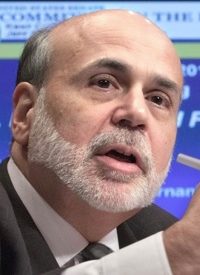
Federal Reserve Chairman Ben Bernanke told lawmakers this week that the government’s borrowing was at “clearly unsustainable” levels, warning that its wild budget deficits increase the possibility of a sudden fiscal crisis which is creeping “ever closer.” The central bank chief also said Washington’s exploding debts would crowd out private-sector investment with damaging consequences for the economy.
Bernanke, who has been widely criticized in recent years for manipulating markets and handing out trillions of dollars to big banks around the world, urged Congress to address its fiscal problems “as soon as possible.” And if something is not done to correct the situation, he warned, it will have serious negative repercussions ranging from a potential fiscal crisis to reduced productivity and growth.
“Even the prospect of unsustainable deficits has costs, including an increased possibility of a sudden fiscal crisis,” Bernanke explained. If investors lose confidence in the government’s ability to manage its finances, interest rates could soar, he added, pointing to the situation seen in a number of other countries recently.
Congress, of course, has been running deficits amounting to well over $1 trillion in recent years. To put that in perspective, the entire GDP of the United States is around $15 trillion. And according to projections by the non-partisan Congressional Budget Office (CBO), that enormous figure is expected to balloon in the coming years unless lawmakers take action.
The acknowledged national debt is already larger than the entire U.S. economy. When unfunded government liabilities are added in, that number soars to estimates ranging in the hundreds of trillions. Experts and economists believe it will be literally impossible to ever pay off the debt without significantly devaluing the dollar at this point. And even the CBO admitted recently that U.S. deficits are “unsupportable.”
“Having a large and increasing level of government debt relative to national income runs the risk of serious economic consequences,” Bernanke warned in prepared remarks during the February 7 Senate Budget Committee hearing. “Although historical experience and economic theory do not indicate the exact threshold at which the perceived risks associated with the U.S. public debt would increase markedly, we can be sure that, without corrective action, our fiscal trajectory will move the nation ever closer to that point.”
But even if the world does not dump the dollar and plunge the nation into unimaginable economic chaos — and many respected economists believe this is a very real possibility, or perhaps even an inevitability — Bernanke told lawmakers that peril still looms. Exploding government debt and persistent unsustainable deficits — at a minimum — would dry up investment capital, almost certainly damaging economic productivity.
“Over the longer term, the current trajectory of federal debt threatens to crowd out private capital formation and thus reduce productivity growth,” Bernanke said at the hearing. To stave off reduced growth and possibly a debt crisis, he noted, would require putting congressional borrowing back on a reasonable path immediately.
“To achieve economic and financial stability, U.S. fiscal policy must be placed on a sustainable path that ensures that debt relative to national income is at least stable or, preferably, declining over time,” he said. “Attaining this goal should be a top priority.”
Unsurprisingly, most news reports on Bernanke’s speech glossed over the warnings by the monetary boss about government debt. Instead, the “establishment” press focused much of its attention on Bernanke’s absurd promises to “shield” the U.S. economy from Europe’s growing financial fiasco.
“We are in frequent contact with European authorities, and we will continue to monitor the situation closely and take every available step to protect the U.S. financial system and the economy,” Bernanke was quoted as saying in countless articles about his testimony. He has already been exposed bailing out European banks and even the region’s central bank on multiple occasions, though how he would protect the American economy from the continent’s trouble was not made clear.
Another significant point made by the Fed chairman was also downplayed or ignored in the mainstream press: He bluntly highlighted the deceptive nature of the U.S. government’s most recent employment figures. While his statement that there is a “long way to go” before the labor market can be said to be “operating normally” was widely cited, his more detailed comments were barely mentioned.
“It is very important to look not just at the unemployment rate, which reflects only people who are actively seeking work,” Bernanke said in response to a question. He also pointed to the millions of Americans who are not counted among the unemployed by the government because they have either given up looking for work or they have taken part-time jobs.
In other words, as The New American reported recently, the Obama administration’s employment numbers are essentially bogus. Most honest experts and economists have known this for years, but hearing the truth from Bernanke on the matter was rather unusual to say the least — especially since the Fed’s so-called “dual mandate” includes promoting maximum employment.
But while Bernanke might have been uncharacteristically honest and blunt in his assessment of some congressional malfeasance — though the picture he painted was likely much rosier than the economic reality facing the United States would seem to justify — he failed to mention the central role played by the Federal Reserve in creating the economic calamities in the first place. And as countless economists and publications including The New American have documented, the Fed’s policies have been probably the single biggest factor contributing to the ongoing economic crisis.
As much of the press was singing his praises, however, a few critics brutally assailed his management of the economy and the effects of Fed policies. “Our central bank tries to manipulate our economy in ways befitting a Soviet commissar,” charged Steve Forbes in a recent piece for Forbes magazine.
In the article, entitled “Ben Bernanke: Socialist Supreme,” Forbes blasted the Fed’s artificial manipulation of interest rates. Also under fire: The central bank’s massive U.S.-government bond holdings and the “central planning” being used to prop up certain favored economic sectors.
“The Fed’s socialist tendencies, as one would expect, ride roughshod over property rights,” the piece explained. “Ben Bernanke’s high-handed actions are a prime argument for why we must restore the gold standard.”
Meanwhile, the Fed announced in late January that it would continue to devalue the dollar and rob savers by holding interest rates at virtually zero until at least 2014. Bernanke also subtly threatened to unleash another tidal wave of new money — known in Fed-speak as “quantitative easing” — by gobbling up more assets to inject cash into the economy.
Of course, gold and silver prices surged after the announcement even as the dollar lost value against other major currencies. And numerous analysts warned after the news broke that the Fed’s failed policies would ultimately contribute to economic chaos of unimaginable proportions.
As Bernanke correctly explained, despite the federal government’s insatiable appetite for borrowing and spending money it does not have, the monstrous deficits cannot go on indefinitely. But the Fed itself — as the chairman undoubtedly understands — is enabling the madness by purchasing bonds and subsidizing U.S. government debt.
If something does not change soon, virtually everyone agrees, the consequences will be dire. But while Congress must indeed reduce the wild spending and borrowing, the Fed itself deserves much of the blame.
Related articles:
Fed Manipulations in the Crosshairs
Friday’s Unemployment Numbers: Correcting the Corrections
Bernanke’s Economic Cure: More Deficit Spending, Re-Inflate Housing Bubble
Fed Showered Money on Foreign Banks
CBO Report: U.S. Deficits “Unsupportable”
Fed Audit: Trillions For Foreign Banks, Conflicts of Interest
Gold Prices Soar on Fed News, Other Factors
Fed Plotting to Monitor Critics, Tailor Propaganda
Americans $2.4 Trillion Poorer After Q3 — It May Get Worse
Fed Data Reveal Trillions in Bailouts to Big Foreign Banks
Study: U.S. Economic Freedom Drops for Fourth Year
Fed Didn’t Recognize Housing Crisis in 2006, Transcripts Show
Printing Money in Britain Doesn’t Work There Either
Housing: Prices and Ownership Still Correcting
Regulatory Agencies Continue to Slow the Economy
U.S. Fed Bailout of Euro Prompts New Push for Audit & Sound Money
George Soros Talks of Economic Collapse in the West
Rich Americans Are Fleeing the Country
Photo: Federal Reserve Chairman Ben Bernanke testifies on Capitol Hill in Washington, Feb. 7, 2012, before the Senate Budget Committee: AP Images



